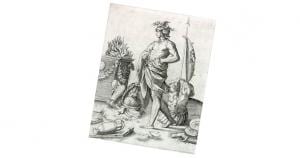 They are so dangerous Plato invented a word for them: Tyrant-Makers.*
They are so dangerous Plato invented a word for them: Tyrant-Makers.*
What do tyrant makers do?
These democratic, state sponsored teachers come to educate the very best students. Their frugal parents want their student to make coin as a result. If the student is smart enough, he realizes that freedom is not the same as liberty. Since he is not being educated in virtue, he chooses freedom over liberty.
Virtue conquers self, absolute freedom indulges self.**
The very cleverest of students will see that freedom, if it is to be absolute, will mean conquering everyone if possible. Even in a democracy, the desires of others will clash with the desires of this budding tyrant. The tyrant-makers, knowing he will someday inherit the cash, indulge him, teaching him “to be the protector of his idea and prodigal appetites, a monstrous winged drone.”*** In the busy hive of the city, this young man will produce nothing really, dabbling in many things, though making sure his tastes remain democratic. He will be ostentatious in sharing the desires of the multitude, though his wealth separates him from us.
The young tyrant might begin with “feasts, carousels, and partying and courtesans,”**** but is smart enough not to end there. Why? Such a life leads to bankruptcy and an end to the party, unless he seizes first his father’s goods, his neighbors, and finally, if he can, the goods of the state.
How? His total freedom will attract sycophants and fellow tyrants from within and without his city. These “henchmen”***** allow another very dangerous possibility:
For when men of this sort and their followers become numerous in a state and realize their numbers, then it is they who in conjunction with the folly of they people, create a tyrant of that one of them who the greatest and mightiest tyrant in his soul.******
He would do anything to gain power, civil war if needed, though since he wishes loot, the tyrant will take power peaceably in the democracy, if he can. Once in power the tyrant will not wish to leave. He has no true friends as friendship would also restrain his freedom: he would reduce everyone to a “hanger on,” if he could. He is miserable, in fact, beyond all the glitter (Shorey calls it “pomp and circumstance”), the city is full of division and turmoil, and he knows some other tyrant waits to gain his power.
He is slave to internal passions and never knows liberty.
The worst is that those who oppose the tyrant generally are worse than the tyrant. They reject liberty, self-control too, and resent the tyrant as governing as he wishes while they have a different set of desires. The opponents of a city like this may prattle of virtue, but wish power. In the end the citizen is reduced to subject as all is given over the desires of the omnipotent tyrannical state.
How can we avoid the tyrant-makers?
Pity, in some degree, the tyrant. He is miserable, if Plato is to be believed. Pity the city ruled by the tyrant more. Spare no pity for the tyrant-makers, the educators in a democracy, the tyrant-makers, that:
- Despise excellence : excellence is hard and tends to be undemocratic (some do better than others),
- Charge as much money as possible
- Give the rich a better education than the masses,
- Placate the masses with more freedom and less liberty
- Avoid hard work in the disciplines, but especially the arts, music, athletic competition for all, science, and dialectic.
Dialectic is hated but the tyrant makers.
Why?
Socratically educated people learn self-discipline, courage, practical wisdom, and justice. Nobody can make such a man a tyrant or a slave. Tell her what to do and she will ask a question. Give her an order and she will wish to understand that order. The lover of wisdom will soon restore a republic of excellence or find herself an exile. What she cannot do, having learned to begin in wonder and end in God is bow to a tyrant or become another sort of tyrant.
A tyrant is hard to defeat without becoming worse than the tyrant. We can, however, consider Plato (as Saint Basil wold suggest), examine our most holy faith, listen and learn. These magi, these tyrant-makers, we can defeat. How? W can simply refuse to hire them. If we have, if mayhap we have been tyrant-makers ourselves, then we can repent and move forward.
How? Follow the Logos where he leads.
———————————————
*Plato, Republic. 572e All translations are from Paul Shorey, though I have translated this particular term myself (as opposed to Shorey’s “kingmaker.”)
This is, so far as I know, the only time term is used as far as I know.
**Having begun badly: Lord Jesus Christ, son of God, have mercy on me, a sinner.
*** Republic 573d.
**** Ibid.
******574b.
******575d.
I am thankful for twenty-two hours of intense dialectic on the Republic with the College that was good, found some truth, and was beautiful.













